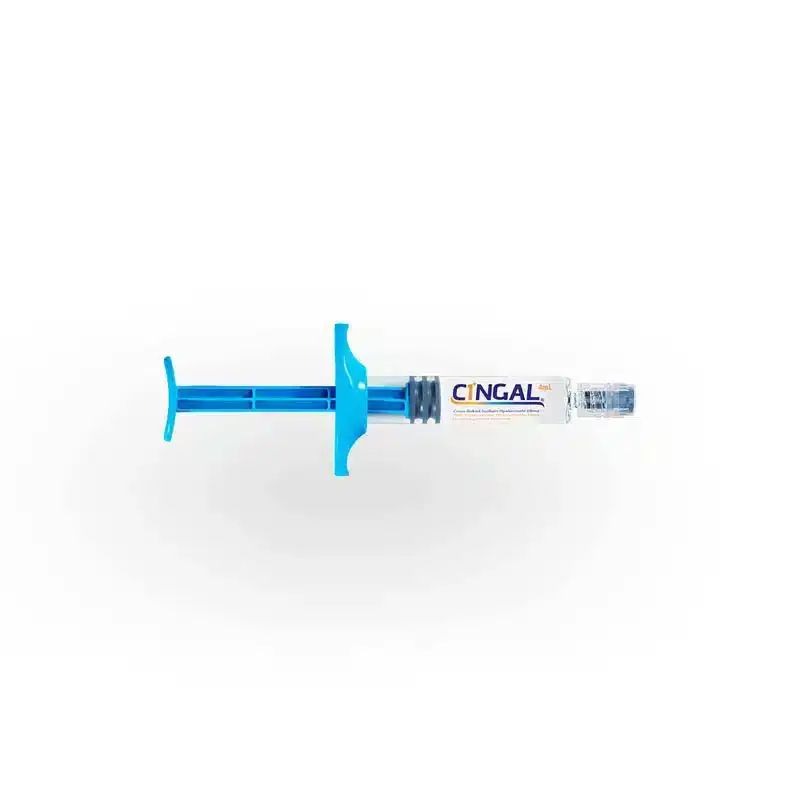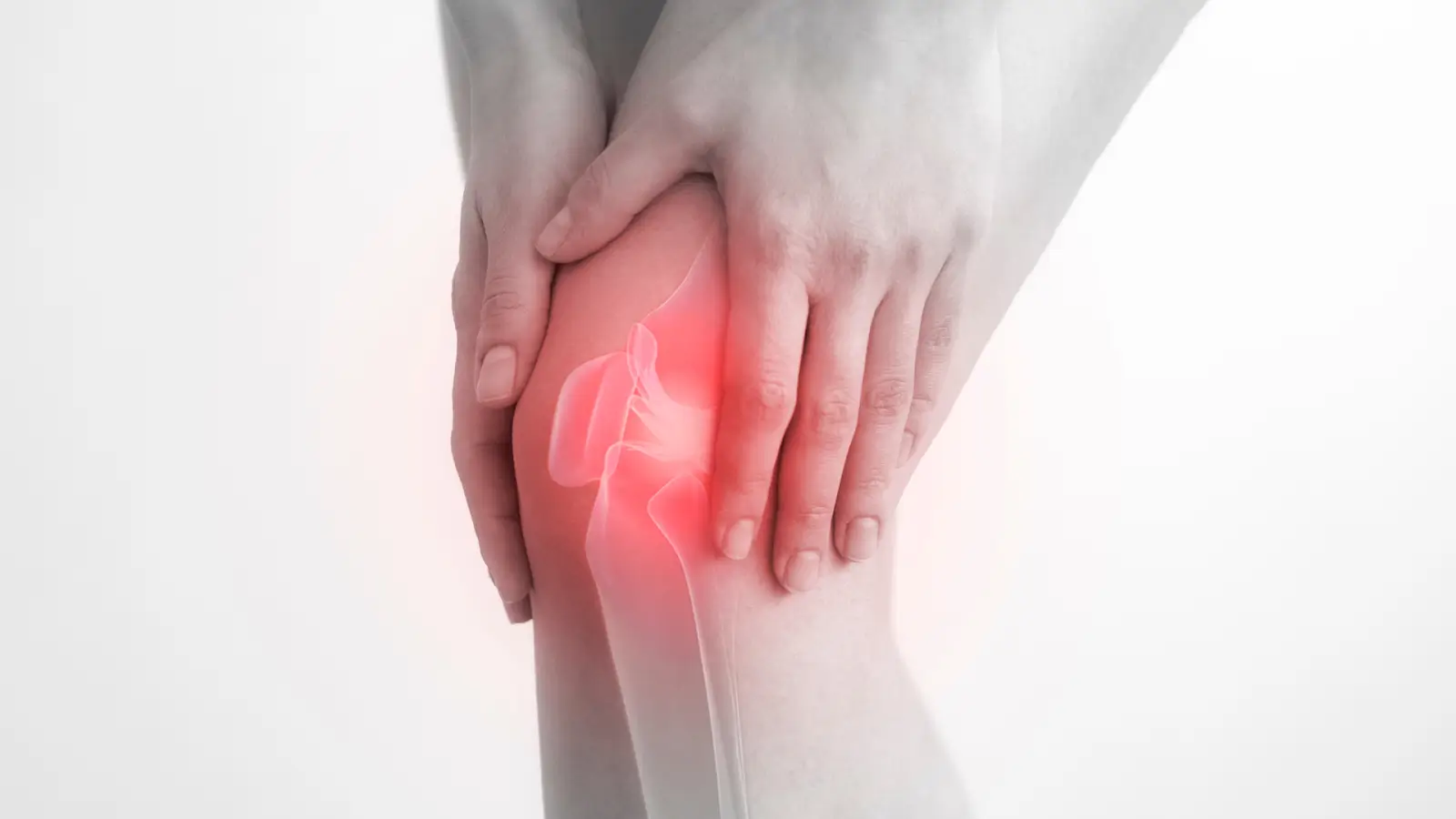Business Hours: Monday - Friday: 9 AM - 6 PM EST

Cingal vs Monovisc – Differences Between OA Treatments
David Fuller
Last Updated On: November 25, 2024
Knee osteoarthritis (OA) affects over 32.5 million adults in the United States, causing chronic pain and limiting mobility. Among the various treatment options, hyaluronic acid injections are often recommended to reduce pain and improve joint function, offering a non-surgical solution for managing OA symptoms.
Cingal and Monovisc are two popular injections designed to relieve OA pain, each with a distinct approach. Cingal combines hyaluronic acid with a corticosteroid for immediate and sustained relief, while Monovisc provides a single, long-lasting hyaluronic acid injection.
This article compares Cingal and Monovisc, highlighting their unique benefits, key differences, and potential uses to help you choose the best treatment for managing knee OA.
Key Takeaways
- Cingal and Monovisc are viscosupplementation injections designed to alleviate knee osteoarthritis (OA) symptoms by improving joint lubrication and reducing pain.
- Cingal combines hyaluronic acid with a corticosteroid, offering immediate pain relief and long-lasting effects for up to six months.
- Monovisc is a single injection of highly purified hyaluronic acid that provides consistent pain relief for up to six months without steroids.
- Cingal is ideal for patients needing rapid relief from acute inflammation, while Monovisc is better suited for those seeking steady, steroid-free symptom management.
About: Operating since 2016, Med Supply Solutions is known for being one of the industry’s top and trusted suppliers of cosmetic and viscosupplementation products. Contact our sales department for more information about buying Cingal online.

CINGAL®
Hyaluronic acid
TRIAMCINOLONE HEXACETONIDE
$249.00
Tier pricing
Save 4.02%
3 or more
$239.00 each
Save 6.02%
11 or more
$234.00 each
Save 8.03%
21 or more
$229.00 each
Introduction to Cingal and Monovisc

Knee osteoarthritis (OA) can significantly impact mobility and quality of life, often requiring treatments beyond basic methods to alleviate pain and improve joint function. Viscosupplementation offers a non-surgical solution, injecting a gel-like substance into the joint to mimic natural synovial fluid, reducing friction and enhancing movement.
Cingal and Monovisc are two popular viscosupplementation treatments that can effectively manage OA symptoms. Cingal provides immediate pain relief and sustained efficacy for up to six months. Monovisc delivers consistent, long-lasting relief for up to six months without the addition of steroids.
Selecting the right treatment is crucial and depends on individual patient needs. By tailoring treatments to specific needs, healthcare providers can optimize outcomes and enhance the quality of life for OA patients.
Composition and Mechanism of Action

Cingal combines two active components: hyaluronic acid and a corticosteroid. The hyaluronic acid acts as a lubricant and shock absorber, mimicking the natural synovial fluid to enhance joint movement and reduce mechanical wear. The corticosteroid provides powerful anti-inflammatory effects, delivering immediate pain relief by reducing swelling and irritation within the joint. This dual-action approach makes Cingal particularly effective for patients with both pain and inflammation.
Monovisc, by contrast, is a single-injection treatment composed of highly purified, non-animal-derived hyaluronic acid. Its formulation restores the natural viscosity of synovial fluid, reducing joint friction and alleviating stiffness. Unlike Cingal, it focuses solely on long-lasting joint lubrication and cushioning, providing steady pain relief and improved mobility for up to six months.
Both treatments target the root causes of OA discomfort (friction, inflammation, and joint degradation), allowing patients to regain mobility and improve their quality of life.
Efficacy and Duration of Relief

Cingal offers rapid and sustained relief by combining hyaluronic acid with a corticosteroid. Studies show that patients experience significant pain reduction within the first few days post-injection, thanks to the corticosteroid’s anti-inflammatory properties.
This immediate relief is followed by the long-lasting effects of hyaluronic acid, which enhances joint lubrication and cushioning. Cingal’s dual-action formula typically relieves symptoms for up to six months, making it ideal for patients seeking fast and extended results.
Meanwhile, Monovisc relies solely on highly purified hyaluronic acid to improve joint function and alleviate OA symptoms. While it does not deliver the immediate anti-inflammatory benefits of a corticosteroid, its single-injection formulation offers consistent, gradual pain relief and improved mobility. Monovisc’s effects last up to six months, comparable to Cingal’s duration of relief.
In comparison, patients with acute inflammation and severe pain prefer Cingal due to its rapid-action steroid component. At the same time, Monovisc better suits those seeking steady, steroid-free symptom management.
Potential Side Effects and Safety
Cingal and Monovisc are generally well-tolerated, but patients may experience some side effects. Common reactions include
- Pain
- Swelling
- Warmth at the injection site.
In rare cases, itchiness or a rash may develop after treatment. These reactions are typically mild and resolve on their own.
Proper care and monitoring are crucial for both treatments to ensure safety and minimize risks. Patients should inform their doctors of known allergies before treatment to reduce the likelihood of adverse reactions.
After an injection, it’s important to watch for unusual symptoms such as persistent redness, severe pain, or signs of infection. This is particularly relevant for Cingal, as Cingal FDA approval has not yet been obtained in the United States, highlighting the need for careful use and expert supervision.
Injection Techniques and Clinical Outcomes
Cingal combines cross-linked hyaluronic acid and triamcinolone hexacetonide and uses a single intra-articular injection to enter the knee joint. The healthcare professional uses a sterile, disposable hypodermic needle (18-21 gauge) under aseptic conditions. Proper penetration into the synovial space is crucial for effective delivery.
Clinical outcomes for Cingal have been promising, demonstrating rapid and long-lasting pain relief. Studies have shown significant improvements in pain, stiffness, and physical function up to 26 weeks post-injection. Cingal provides both immediate pain relief from the steroid component and sustained relief from the hyaluronic acid.
Monovisc is a single-injection viscosupplement containing cross-linked hyaluronic acid. It also treatst the knee joint through intra-articular injection techniques. The injection technique follows the same aseptic procedures as Cingal, ensuring accurate delivery into the joint space.
Clinical outcomes for Monovisc also show significant pain reduction and improved joint function. While Monovisc does not contain a steroid, its hyaluronic acid component provides long-term symptomatic relief for osteoarthritis. Cingal and Monovisc have demonstrated superior efficacy to saline controls in clinical trials.
Conclusion
Cingal and Monovisc offer effective solutions for managing knee pain from osteoarthritis, each with unique advantages. Cingal combines hyaluronic acid with a corticosteroid, delivering both quick relief and long-lasting effects. Monovisc, by contrast, uses only hyaluronic acid, providing consistent symptom relief for up to six months.
Both treatments are valuable options, but their effectiveness depends on individual needs and priorities. By considering each patient’s specific symptoms and lifestyle, doctors can recommend the most suitable treatment, helping to improve mobility and enhance quality of life.
FAQs
1. What is the main difference between Cingal and Monovisc?
Cingal combines hyaluronic acid with a corticosteroid for immediate and extended pain relief, while Monovisc uses only hyaluronic acid for consistent, long-term symptom management.
2. How long do the effects of these treatments last?
Cingal and Monovisc typically provide symptom relief for up to six months, depending on individual patient factors.
3. Who should consider Cingal?
Cingal is ideal for patients with acute inflammation and severe pain who need rapid relief combined with long-term benefits.
4. Are there any side effects?
Common side effects include mild pain, swelling, or warmth at the injection site. Rarely, patients may experience itchiness or a rash.
References
Centers for Disease Control and Prevention. (n.d.). Arthritis. Centers for Disease Control and Prevention. Retrieved November 20, 2024, from https://www.cdc.gov/arthritis/
Hangody L, Szody R, Lukasik P, et al. Intraarticular Injection of a Cross-Linked Sodium Hyaluronate Combined with Triamcinolone Hexacetonide (Cingal) to Provide Symptomatic Relief of Osteoarthritis of the Knee: A Randomized, Double-Blind, Placebo-Controlled Multicenter Clinical Trial. Cartilage. 2017;9(3):276-283. doi:10.1177/1947603517703732
Products
Cart
Log In
Newsletter
Subscribe for exclusive offers and updates on new arrivals
Share feedback at:
Working Hours
Monday to Friday: 9 AM to 6 PM EST
The Most Popular Brands
Med Supply Solutions
Support
Copyright 2025. Med Supply Solutions